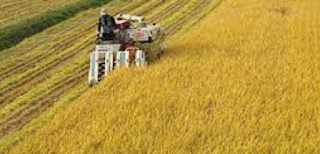Unveiling the Impact of Climate Change: Five Crops Facing Extinction and Global Food Security Concerns
As extreme weather events surge worldwide, the ominous shadow of a looming food crisis is becoming increasingly apparent. In Nigeria, militants have resorted to attacking villages in search of food, highlighting the gravity of the situation. Climate and food experts assert that the intensification of heat waves, floods, and droughts is significantly affecting global food security.
A recent Forbes article delves into the alarming implications of the climate crisis, identifying five crops that may no longer grace our tables: grapes, olives, blueberries, rice, and potatoes. The year 2023, marked as the hottest on record, witnessed a global surge in food costs, exacerbating challenges for low-income consumers and jeopardizing nutrition levels worldwide.
The Unfolding Crisis: Temperature- and climate-sensitive fruits like grapes, olives, and blueberries are poised to experience a drastic reduction in production in 2023. This decline ripples through various food products that depend on these fruits. The International Organization of Vine and Wine (OIV) reported a staggering 7% drop in global wine production—a 30-year low—attributed to poor harvests in major grape-producing countries.
Chile, the southern hemisphere's largest wine producer, faced a 20% reduction in grape production due to drought and wildfires. Australia witnessed a quarter decrease, while Spain and Italy experienced drops of 14% and 12%, respectively, owing to drought and heavy rainfall.
Parts of Spain saw a staggering 60% decrease in grape production, prompting warnings from the Federation of Agricultural Cooperatives of Catalonia about the potential 60% drop in grape production in 2023, impacting grape prices and derivatives. Blueberries and olives faced similar challenges, with Peru, the world's leading blueberry producer, witnessing over a 50% decline in exports due to rising temperatures.
Olive Oil in Crisis: Spain, the world's leading olive producer, saw a 50% reduction in olive oil production from April 2022 to May 2023. Unprecedented temperatures, up to 4°C above normal, adversely affected olive trees in the Mediterranean, impacting olive oil used in various Western products. This led to a surge in prices for canned goods using olive oil as a preservative in 2023.
Staple Food Shortages: Rice and potatoes, staples in global diets, faced significant production declines. La Niña followed by El Niño in June 2023 triggered a global rise in rice prices, with the Food and Agriculture Organization (FAO) reporting a 24% increase in the rice price index in October 2023. India and Italy, major rice exporters, experienced declines due to a delayed monsoon and consecutive years of drought.
Potatoes, a global dietary cornerstone, are expected to see an 18% to 32% decline in yields in the coming decades without adequate climate change mitigation. In 2023, heavy rains in the UK led to a record-low potato harvest, subsequently causing a surge in European potato prices. Bolivia, a significant potato exporter, witnessed plummeting shipments due to unprecedented high temperatures, followed by heavy rains and frosts.
Global Ramifications: Climate and food experts emphasize that food, being a global commodity, renders countries reliant on imports susceptible to supply and price shocks from climate impacts. Extreme weather events have a domino effect on global food markets, trade, and prices, with the Energy and Climate Intelligence Unit (ECIU) of the Food and Agriculture Organization urging collaborative efforts to find effective solutions.
The UK, importing $2.25 billion worth of food from eight climate-vulnerable African countries, is particularly exposed to the impacts of extreme weather. Urgent action is needed to address climate-related challenges and ensure food security for the growing global population.
In conclusion, the intersection of climate change and agriculture is casting a long shadow over our global food supply. Addressing these challenges collectively and urgently is imperative to safeguard not only our diets but also the livelihoods of farmers and the stability of national economies worldwide.
- #ClimateChangeImpact, #FoodCrisisAlert, #GlobalFoodSecurity, #ExtremeWeatherEffects, #ClimateActionNeeded

